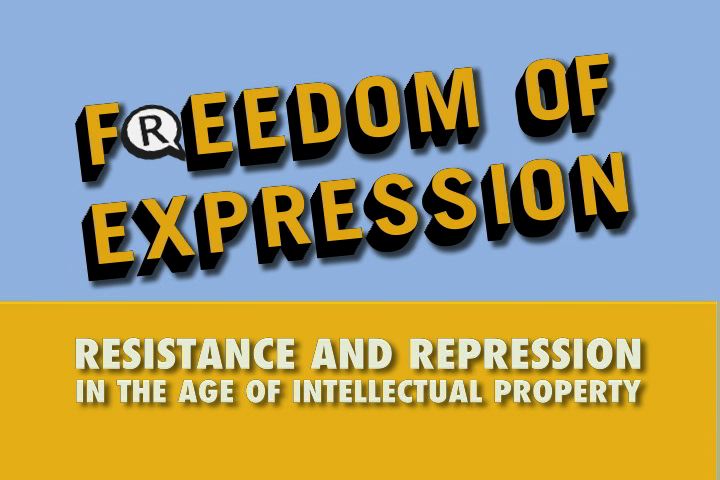If you’re in the New York City region, this is worth checking out (features Institute fellow Siva Vaidhyanathan):

From Free Culture @ NYU:
In 1998, university professor Kembrew McLeod trademarked the phrase “freedom of expression” – ?a startling comment on the way that intellectual property law can restrict creativity and the expression of ideas. This provocative and amusing documentary explores the battles being waged in courts, classrooms, museums, film studios, and the Internet over control of our cultural commons. Based on McLeod’s award-winning book of the same title, Freedom of Expression® charts the many successful attempts to push back the assault on free expression by overzealous copyright holders.
In cooperation with the Media Education Foundation and La Lutta, Free Culture @ NYU is screening Freedom of Expression®: Resistance and Repression in the Age of Intellectual Property at 9pm on Thursday, January 31.
Narrated by Naomi Klein, the film features interviews with Stanford Law’s Lawrence Lessig, Illegal Art Show curator Carrie McLaren, Negativland’s Mark Hosler, UVA media scholar Siva Vaidhyanathan, and Free Culture @ NYU co-founder Inga Chernyak, among many others. This 53-minute documentary will be preceded by selections from Negativland’s new DVD, Our Favorite Things, and it will be followed by a Q&A with Freedom of Expression® author and director Kembrew McLeod and co-producer Jeremy Smith.
Freedom of Expression Screening and Q&A with Creators
Sponsored by Free Culture @ NYU, NYU ACM, and WiNC
Free and Open to the Public (bring ID if non-NYU)
Thursday, January 31, 2008
9:00pm
NYU’s Courant Institute
Room #109
251 Mercer Street b/w Bleecker and W. 4th
On the film’s site, I found this very clever (if slightly spastic) DVD extra, “A Fair(y) Use Tale”:
Category Archives: fairuse
youtube purges: fair use tested
Last week there was a wave of takedowns on YouTube of copyright-infringing material -? mostly clips from television and movies. MediaCommons, the nascent media studies network we help to run, felt this rather acutely. In Media Res, an area of the site where media scholars post and comment on video clips, uses YouTube and other free hosting sites like Veoh and blip.tv to stream its video. The upside of this is that it’s convenient, free and fast. The downside is that it leaves In Media Res, which is quickly becoming a valuable archive of critically annotated media artifacts, vulnerable to the copyright purges that periodically sweep fan-driven media sites, YouTube especially.
In this latest episode, a full 27 posts on In Media Res suddenly found themselves with gaping holes where video clips once had been. The biggest single takedown we’ve yet experienced. Fortunately, since we regard these sorts of media quotations as fair use, we make it a policy to rip backups of every externally hosted clip so that we can remount them on our own server in the event of a takedown. And so, with a little work, nearly everything was restored -? there were a few clips that for various reasons we had failed to back up. We’re still trying to scrounge up other copies.
The MediaCommons fair use statement reads as follows:
MediaCommons is a strong advocate for the right of media scholars to quote from the materials they analyze, as protected by the principle of “fair use.” If such quotation is necessary to a scholar’s argument, if the quotation serves to support a scholar’s original analysis or pedagogical purpose, and if the quotation does not harm the market value of the original text — but rather, and on the contrary, enhances it — we must defend the scholar’s right to quote from the media texts under study.
The good news is that In Media Res carries on relatively unruffled, but these recent events serve as a sobering reminder of the fragility of the media ecology we are collectively building, of the importance of the all too infrequently invoked right of fair use in non-textual media contexts, and of the need for more robust, legally insulated media archives. They also supply us with a handy moral: keep backups of everything. Without a practical contingency plan, fair use is just a bunch of words.
Incidentally, some of these questions were raised in a good In Media Res post last August by Sharon Shahaf of the University of Texas, Austin: The Promises and Challenges of Fan-Based On-Line Archives for Global Television.
how to keep google’s books open
Whip-smart law blogger Frank Pasquale works through his evolving views on digital library projects and search engines, proposing a compelling strategy for wringing some public good from the tangle of lawsuits surrounding Google Book Search. It hinges on a more expansive (though absolutely legally precedented) interpretation of fair use that takes the public interest and not just market factors into account. Recommended reading. (Thanks, Siva!)
